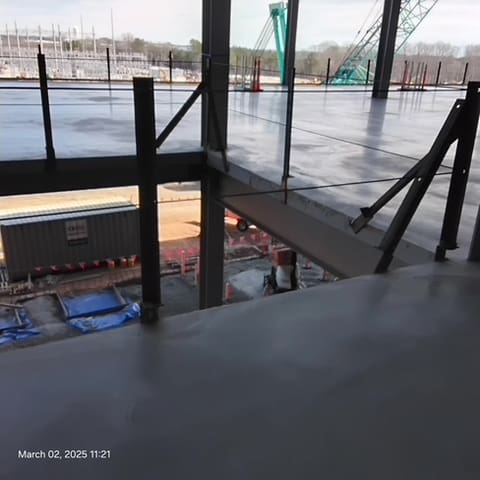
Case filed in Fayette County
The plaintiffs — including longtime safety professionals Cheree Pace and Alton R. Matthews — filed their case earlier this year (2025-CV-0762). They argue that while QTS and its general contractor, HITT Contracting, promoted a public “culture of care,” the reality on site was very different.
According to court filings, qualified safety staff were sidelined while undertrained supervisors were advanced, creating hazards that eventually led to worker deaths and serious injuries.
“Our warnings were ignored until it culminated in the June 29 fatality,” Pace said. “It wasn’t a matter of if, but when.”

Workers allege retaliation
Pace, a 15-year veteran of the industry, said she was fired in December 2024 after weeks of being harassed, isolated, and then blamed for safety issues she tried to correct. She claims she was blacklisted from future projects despite a strong record.
“They mob-bullied me out,” Pace said. “I just wanted to make sure people were safe, but instead of fixing the problems, they got rid of me.”
Matthews tells a similar story. He was working as a safety manager under subcontractor Brigada Construction when he says he was terminated for insisting on proper training and documentation.
“I asked for proof of operator certifications and raised concerns about untrained workers, and next thing I knew I was out of a job,” Matthews said. “They even invented a sexual harassment complaint that the worker herself denied.”
Push to federal court
The case highlights not just workplace culture but also legal maneuvering. Attorneys for the contractors are attempting to move the matter out of Fayette County Superior Court and into federal court. Plaintiffs argue the issues — retaliation, wrongful termination, defamation — are state matters.
“We want it kept local,” Matthews said. “What happened to us happened right here in Georgia, and that’s where it belongs.”
For now, the group is trying to proceed without full legal representation. Both Pace and Matthews acknowledged the difficulty of securing counsel, citing high costs. Still, they say they are determined to press ahead.
“I can’t afford an attorney right now,” Pace said in an email to The Citizen. “But I’m hopeful this will be resolved soon.”
Larger implications
The QTS site has already drawn scrutiny from multiple lawsuits. This case, filed in Fayette County Superior Court by former safety managers including Cheree Pace and Alton R. Matthews, focuses on retaliation and blacklisting after they raised concerns about unsafe practices.
According to the Atlanta Journal-Constituation, a separate wrongful-death suit centers on the June 28, 2025 death of 25-year-old Anthony J. Riera Azuaje, who was electrocuted while working for subcontractor Andrew Electric. According to the complaint, he came into contact with a metal conduit that had been improperly grounded, collapsed from a scissor lift, and died four days later despite hospital care. His parents, Perpetio Antonio Riera Graterol and Noris Maritza Azuaje Montilla, allege that electrical subcontractor Allison-Smith violated National Electrical Code standards and installed faulty fittings. They are seeking damages for their son’s pain and suffering, funeral expenses, lost income, and punitive damages, arguing the company showed “an entire want of care” toward worker safety.
While QTS itself has not been named as a direct defendant in either case, both lawsuits point to a culture on site that the plaintiffs say prioritized speed and profit over basic safety.
“This isn’t just about our jobs,” Matthews said. “It’s about a system that values speed over safety. And until that changes, tragedies will keep happening.”
The next step will be a judge’s ruling on whether the retaliation lawsuit remains in Fayette County or is moved to federal court. Either way, the outcome could test how much protection whistleblowers and safety professionals truly have on one of Georgia’s largest construction projects.
Both QTS and HITT Contracting declined to be interviewed or issue a full statement around any of these allegations, citing that they would not comment on active court cases.
Comments
This site uses User Verification plugin to reduce spam. See how your comment data is processed.